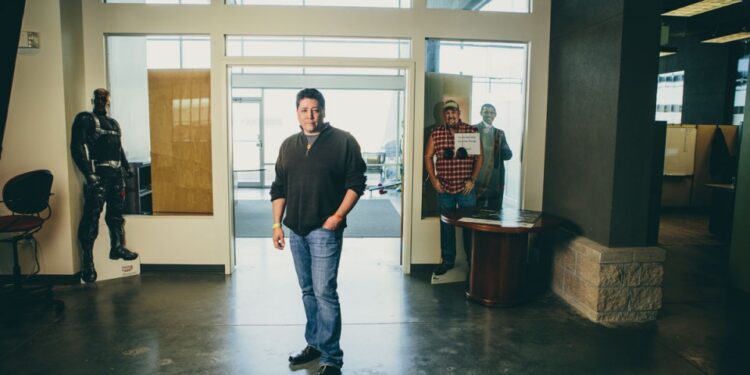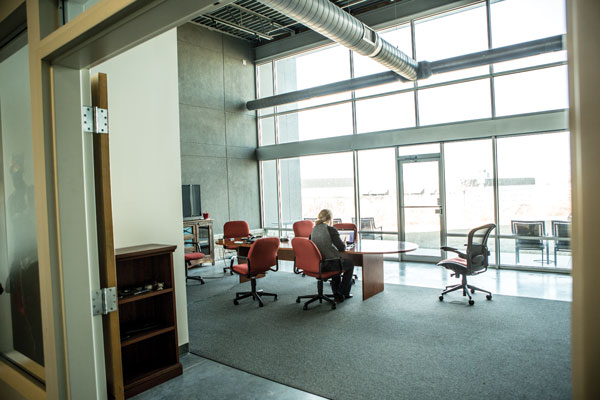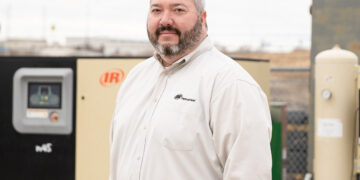In 2004, Mark Griffis founded Aviture as a response to Lockheed Martin’s request that he subcontract for them on a long-term project. The former Air Force officer turned serial entrepreneur had been consulting for the defense technology corporation when they asked him to stay with the project. “I had two days to come up with a name,” Griffis recalls.
Fast forward to 2013. Aviture had grown from a small startup into a stable software development company with enviable contract relationships with large corporations such as Lockheed. And Griffis decided it was time for Aviture to walk away.
Working for a Lockheed or a Northrup is great, he says, but it wasn’t helping Aviture move forward. “Let’s make a difference as Aviture without necessarily needing the support of a larger corporation.”
When a few contracts came up for renewal last summer, “we just decided we were done,” Griffis recalls. “We had enough work of our own, and we focused on getting this new space.” Aviture moved into a contemporary office space near I-80 and 132nd St. in the spring of 2013.
Ryan Wade, Aviture’s Vice President of business development, would put the company’s turning point back even further. “2010 was about realigning our customer base,” he says. Being choosy about the contracts they accepted meant a smooth transition into product development while not leaving Aviture’s consulting side behind entirely.
So while Aviture is still handling some government projects (like UAV [Unmanned Aerial Vehicle] mission planning software), the company is moving into the commercial sphere, focusing on web development and data analytics. “Everybody can put a dot on a map now,” Griffis says. “But what are you going to do when you have 1,500 dots on a map? What are you going to do with that information? Those are the types of problems we want to solve.”
His goal for Aviture is to provide data analysis that’s easily visualized and absorbed so that businesses can get back to work quickly. After all, 1,500 dots on a map create a blob of information that’s difficult to wade through, if not useless.
For military operations, Griffis points out, missed opportunities from poor data analysis can put lives at stake. “In the business world, it’s not as dire,” he says, “but if you miss an opportunity, your business can definitely suffer. That’s what we try to offer insight into.”
According to Griffis, the same technology that can solve the problems of military mission logistics can be put to work solving problems with 3D surgical imaging, concussion analysis, or back-of-the-house restaurant management. “Understand what a customer is trying to do and why,” he says. “Then you can apply the technology.”
“We look at things from a business perspective,” Wade adds, “which I think is unique in tech. We have experience in developing and actually bringing products to market.”
Creating products that clients can easily apply to their own businesses means that Aviture employees have to have a strong desire to learn. “It’s not just coding,” Griffis says. “It’s not saying go make this widget. It’s understanding why, always asking why.”
To find those people, Griffis launched a second part to Aviture’s 2013 pivot: a technology business incubator attached to Aviture. He calls it The Garage. “My dream would be to create this pipeline where people come in with Aviture, find their passion in The Garage, and follow it out.”
The new incubator, he says, is a risk-mitigated way to get involved in Omaha’s startup environment.
About four fledgling business ideas are active in The Garage. Some are still very early stage (“part of this is education,” Griffis explains. “About mentoring them. Is the market there? What are the distribution channels? How are you going to raise money?”), and some are ready to move out (Huntforce, a trail camera management company, is going into its second round of funding).
All of the business concepts represented in The Garage exhibit Griffis’ desire to encourage Omahans to create on the next level of innovation. “I believe we don’t need more coders,” Griffis says. “We need more technology leaders, people who know how to apply technology.” Promoting this philosophy, Aviture hosted Hack Omaha last year, a weekend hackathon where programmers attempted to create useful products from city data.














